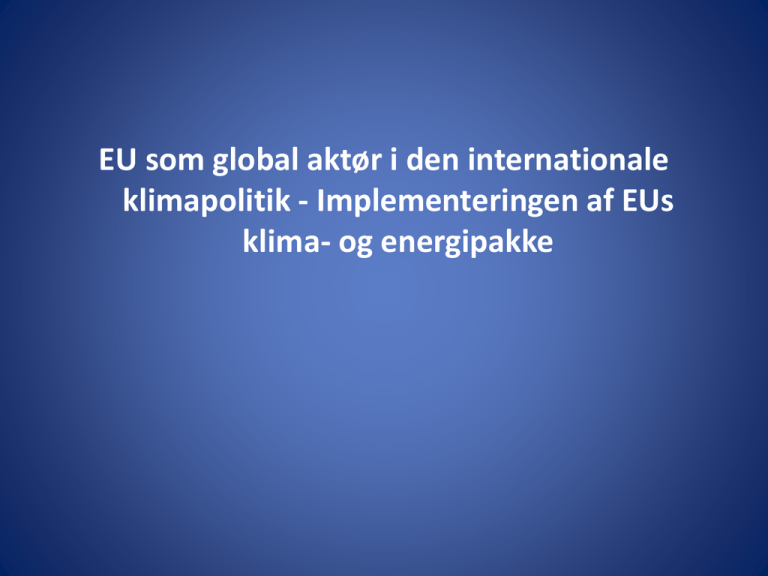Præs. 12 nov
advertisement

EU som global aktør i den internationale klimapolitik - Implementeringen af EUs klima- og energipakke European 2020 strategy http://ec.europa.eu/commission_20 10-2014/hedegaard/index_en.htm Commission creates two new Directorates-General for Energy and Climate Action Two new Directorates-General have been created: DG Energy (ENER) and DG Climate Action (CLIM). The commisions process of appointing generals delayed the implementation process while it was in caretaker mode. It also agreed to transfer a number of activities from one DG to another to better align them with the responsibilities of the respective portfolios of the Commissioners. The DGs concerned are those for Mobility and Transport, Competition, Enterprise and Industry, Environment, Humanitarian Aid and Health and Consumers.To advance the Commission's strategic approach on research, a task force, to be chaired by the Secretary-General, has been set up. This will launch a strategic reflection at Commission level on the evolution of the research budget, the degree of externalisation in the management of research programmes and the links between research and other policies in organisational terms. EU’s Klima- og Energipakke 2013-2020 • Præsenteret af Kommissionen den 23. januar 2008. • Klima- og energipakken lægger pres på at fremme energieffektivitet, men det er EU’s Energy Efficiency Action Plan, som adresserer udfordringerne direkte. • Hvis der opnås en global klimaaftale (til COP15?), som medfører at andre udviklede lande også forpligter sig til at gøre en seriøs indsats, vil EU som helhed gå med til at formindske sin drivhusgasudledning med 30 %. The 20-20-20 Targets • En reduktion af EU-drivhusgasser til mindst 20 % under 1990niveau • 20 % af EU’s energiforbrug skal stamme fra vedvarende energikilder • En reduktion på 20 % af energiforbruget • Direktiv om fremme af vedvarende energikilder (VE-diktivet) • Direktiv til ændring af EU’s kvotehandelssystem • Beslutning om reduktion af drivhusgasudledning fra ikke-kvotebelagte sektorer • Direktiv om CO2-opsamling og lagring i undergrunden (CCS) 2 main challenges 1) The logic of the capitalist system goes against sustainable development inherently 2) Lack of viable potential conditions of possibility for bridging the gaps and disparaties within a trans-disiplinary field or research. Positive processes 1) Opening up to public scrutiny 2) Politicisation of climate science 3) New media has enabled the entry of new & important voices into the climate debate 4) Gradual move from carbon cost to consumer and not producer (Helm) “Any serious attempt to address global climate change must contend with global capitalism… This conception of the world is incompatible with an effective global response to climate change.” -Wainwright, 2010 disconnect is all the more surprising because it has been widely claimed— notably in the immensely influential Stern Report (Stern, 2007)4— that the costs of action now are comparatively small; smaller even than the typical annual differences between forecast and actual GDP. A 1 per cent GDP cost to stabilize emissions is perhaps less, even, than the current impacts of the credit crunch. Indeed, some claim that mitigating climate change is actually International Transnational National Business Science Politics Adaptive Governance Decision Making: Decentralized & Bottom–up Specialized networks: Support central authorities in allocate resources Case studies: Successful local policies can be shared in networks of voluntary information diffusion Policy Processes: Serial, relying on appraisals & building on successful ones Integrative: Each factor is contingent on a working ‘‘model’’ of the whole case; gaps and inconsistencies in it prompt revisions Tension exists within realms “Research (on the climate issue) to date has resulted mainly in technical advances and that our understanding of the physical processes that are driving climate has run far ahead of our explanations of the social processes driving the physical processes” -Wainwright 2010 EU’s role marginalized @ the international level Disparity between who suffers the problem, who caused it, who addresses it & who currently benefits disproportionately from global emissions -Roberts & Parks, 2007 Bibliography • Helm, D (2010) Climate-change policy: why has so little been achieved? USA: Oxford Journals • Brunner, R.D. (2010) Adaptive governance as a reform strategy. Boston: Policy Sciences • Brunner, R. D., & Lynch, A. H. (2010). Adaptive governance and climate change. Boston: AmericanMeteorological Society